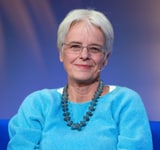Contents
Two economic experts are arguing about the question of whether “green growth” is possible.
“The End of Capitalism” has been on the Spiegel bestseller list for six months. The German business journalist Ulrike Herrmann hit a nerve with her book.
With her call to shrink the economy, she encounters resistance from the Swiss economist Monika Bütler. This is convinced that technology will make climate-friendly growth possible.
SRF: Is it even possible to decouple CO2 emissions from economic growth?
Monika Bütler: We have had this decoupling for a long time. There is no reason to suppose that a system that has brought us so much prosperity – not only material, but also health and happiness – cannot also be the system that can accompany these adjustments.
Ulrike Herrmann: There are only a few years left until we have to become climate neutral. But the technical cycles are much longer. One can no longer hope for innovations or miracle technology. We have to do it with the technology we already have. It is clear: the eco-energy will not be enough to fuel the entire capitalist system plus growth. And the fact that emissions have fallen in Switzerland and Germany is mainly due to the fact that we have outsourced the dirty energy, for example to China.
Monika Bütler: But they still sunk.
Ulrike Herrmann: But only by 15 percent. If we continue at this snail’s pace until 2045, one thing is very clear: we will not become climate neutral. But you have to understand that we have to get to net zero, otherwise there is a risk of climate catastrophe.
In 1978 we were half as rich but just as happy as we are today.
Monika Bütler: We simply don’t know the technologies yet. If we had to go back 40 years and predict what was happening, we would have been dead wrong. At the same time, we have many technologies that are not yet fully exploited. There is a lot of research going on in solar energy at the moment. In addition to solar and wind, there is also nuclear energy, where a lot of research is also being done.
SRF: Ulrike Herrmann, you say we should follow the example of war economy and rationing.
Ulrike Herrmann: We need state planning to manage this huge conversion. But the good news is: we wouldn’t be as poor as Switzerland was in World War II. Even if we had to give up 50 percent of our economic output, we would still be as rich as we were in 1978. Those who were there know that we were just as happy as we are today.
Rationing is a shadow battle.
Monika Bütler: There is a big difference between rationing in wars, when there is not enough food, and being forced to do without in an affluent society. People will never accept that. We have to deal with climate change, but rationing is a shadow fight that does no one any good.
Ulrike Herrmann: It has to succeed democratically. And the majority will probably realize too late that the hut is on fire and will only act when it is no longer possible to prevent the climate world from getting out of control. Only: Then we are also in a war economy. Because we will only survive this climate crisis with state control. In other words, capitalism is definitely coming to an end.
Reto Lipp conducted the interview.

